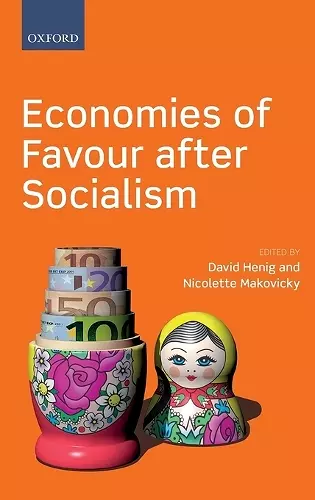Economies of Favour after Socialism
Nicolette Makovicky editor David Henig editor
Format:Hardback
Publisher:Oxford University Press
Published:15th Dec '16
Currently unavailable, and unfortunately no date known when it will be back

Since the onset of the global economic crisis, activists, policy makers, and social scientists have been searching for alternative paradigms through which to re-imagine contemporary modes of thinking and writing about economic orders. These attempts have led to their re-engagement with fundamental anthropological categories of economic analysis, such as barter, debt, and the gift. Focusing on favours, and the paradoxes of action, meaning, and significance they engender, this volume advocates for their addition to this list of economic universals. It presents a critical re-interrogation of the conceptual relationships between gratuitous and instrumental behaviour, and raises novel questions about the intersection of economic actions with the ethical and expressive aspects of human life. Scholars of post-socialist politics and society have often used 'favour' as a by-word for corruption and clientelism. The contributors to this volume treat favours, and the doing of favours, as a distinct mode of acting, rather than as a form of 'masked' economic exchange or simply an expression of goodwill. Casting their comparative net from post-socialist Central, Eastern, and South Eastern Europe; to the former Soviet Union, Mongolia, and post-Maoist China, the contributors to this volume show how gratuitous behaviour shapes a plethora of different actions, practices, and judgements across religious and political life, imaginative practices, and local moral economies. They show that favours do not operate 'outside' or 'beyond' the economic sphere. Rather, they constitute a distinct mode of action which has economic consequences, without being fully explicable in terms of transactional cost-benefit analyses.
,,,innovative and inspiring * Matías Dewey, Max Planck Institute for the Study of Societies, the european electronic newsletter *
Assembling a stellar collection of authors to address an exceptionally well formed and originalset of questions, this book achieves for favours what Humphrey and Hugh-Jonesâs seminal Barter, Exchange, and Value did for barter: the creation of a sophisticated new category for comparative analysis. It also brings the anthropology of ethics into conversation with economic anthropology in a highly creative way, greatly to the benefit of both: a work of real importance. * James Laidlaw, William Wyse Professor of Social Anthropology, University of Cambridge *
This collection offers a timely and compelling inquiry into favors as the âpower of the exceptionâ illustrating the rule.Ethnographic accounts of how people strive to live the good life, understood in moral and material terms, take us beyond the familiar condemnatory analyses of corruption and patronage to offer new perspectives on exchange, debt, gifts, reciprocity and the social relations that sustain them. * Catherine Wanner, Professor of History, Anthropology, and Religious Studies, Pennsylvania State University *
This book is not just for scholars of Eurasian post-socialisms. The contributors show convincingly that the centrality of favours to so many dimensions of social, cultural, economic, and political life in this part of the world is fertile ground for advancing broader analytical frameworksâof morality and ethics, of economy and society, of the semiotics of social life, and a great deal more. Favours have finally earned their own distinct place in social and cultural anthropology. * Douglas Rogers, Associate Professor of Anthropology, Yale University *
In the popular imagination, favours are easily taken as the ultimate proof of the ideological and utilitarian failure of socialism. But the contributions to this volume show that favours are important to all economic formations, including the many invocations of capitalism in contemporary Post-Socialist countries.The ethnographies of favours offer intimate accounts of how new forms of inequality emerge and some old ones continue, of everyday struggles for respectability in volatile situations, and reveal how people navigate complex and contradictory moral demands. This volume illustrates how important it is to take people's own classifications of economic practices serious and that such classifications âin this case, favours- are fundamental to the advancement of economic theory. * Erik BÃhre, Associate Professor of Anthropology, University of Leiden *
Casting a bright, new light on favours in the economy, the authors show that favours are embedded in moral and ethical ideals even when they subvert authorized practices.Neither purely instrumental nor mutual acts, neither reciprocity nor contract, favours are anomalous practices in formal economics just as they can be ambiguously interpreted in everyday life. The essays display how productive this ambiguity can be for a flourishing material existence. * Stephen Gudeman, Professor of Anthropology, University of Minnesota *
ISBN: 9780199687411
Dimensions: 240mm x 166mm x 19mm
Weight: 510g
254 pages